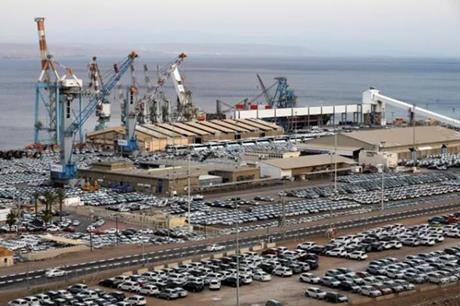After four months of a Yemeni maritime blockade on Israel, the latter’s authorities have announced plans to lay off half of the staff at the occupied port of Umm al-Rashrash (Eilat), marking the complete collapse of its operations. The effective Yemeni front has not only closed the port but also impacted a portion of Israel’s economy and reputation of its American and British patrons.
According to reports published by Hebrew media and international agencies, including Reuters, the administration of the port of Umm al-Rashrash (Eilat) announced last week its intention to lay off half of the port’s 120 employees. This is due to the port suffering a “major financial blow” as a result of no ships arriving there for four months due to the Yemeni maritime blockade.
Reuters quoted the port director, Gideon Golber, saying, “This step is the last option after losses and a slowdown in activity for months.” He added, “We were hoping that the coalition countries (America and Britain) would solve the problem, but they are doing so,” which represents a new and clear confirmation of the failure of the United States and Britain in the task of protecting Zionist navigation.
Golber said, “Ships are still avoiding docking in Eilat, and if the government does not intervene to help pay salaries, then laying off workers is inevitable.” He indicated that “the remaining workforce can maintain a minimum of operations.”
The workers’ union in Israel objected to the port administration’s decision, and the port carried out protest stands according to the reports.
The closure of the port affects a part of Israel’s economy, as it used to receive many imports from the East, most notably cars. Hebrew media confirmed in recent weeks that their market is experiencing a major crisis in Israel. The closure of the port also affects the economic situation in the city of Umm al-Rashrash (Eilat) in general, where the city is witnessing an increase in the unemployment rate and a collapse of the tourism sector, which was its most prominent tourism area, which represents a crisis for the enemy’s economy in general.
The Yemeni maritime blockade also affects the movement of other enemy ports, which depended on the Red Sea route to receive many goods coming from the East. This has led to a rise in prices in February, reaching more than 40%, and the disappearance of many goods from the markets. The Zionist Ministry of Economy admitted in February that the Yemeni blockade affected 25% of consumer goods imports and 21% of production materials imports and hit the competitiveness of exports.
The Yemeni blockade also created a state of uncertainty that affected Israel in terms of major foreign investments. Recently, the UAE’s “ADNOC” and Britain’s “BP” companies canceled a huge deal with the Israeli gas company “Neomed” due to regional tensions. Hebrew media accused those they called “Houthis” of being behind the failure of the deal.







